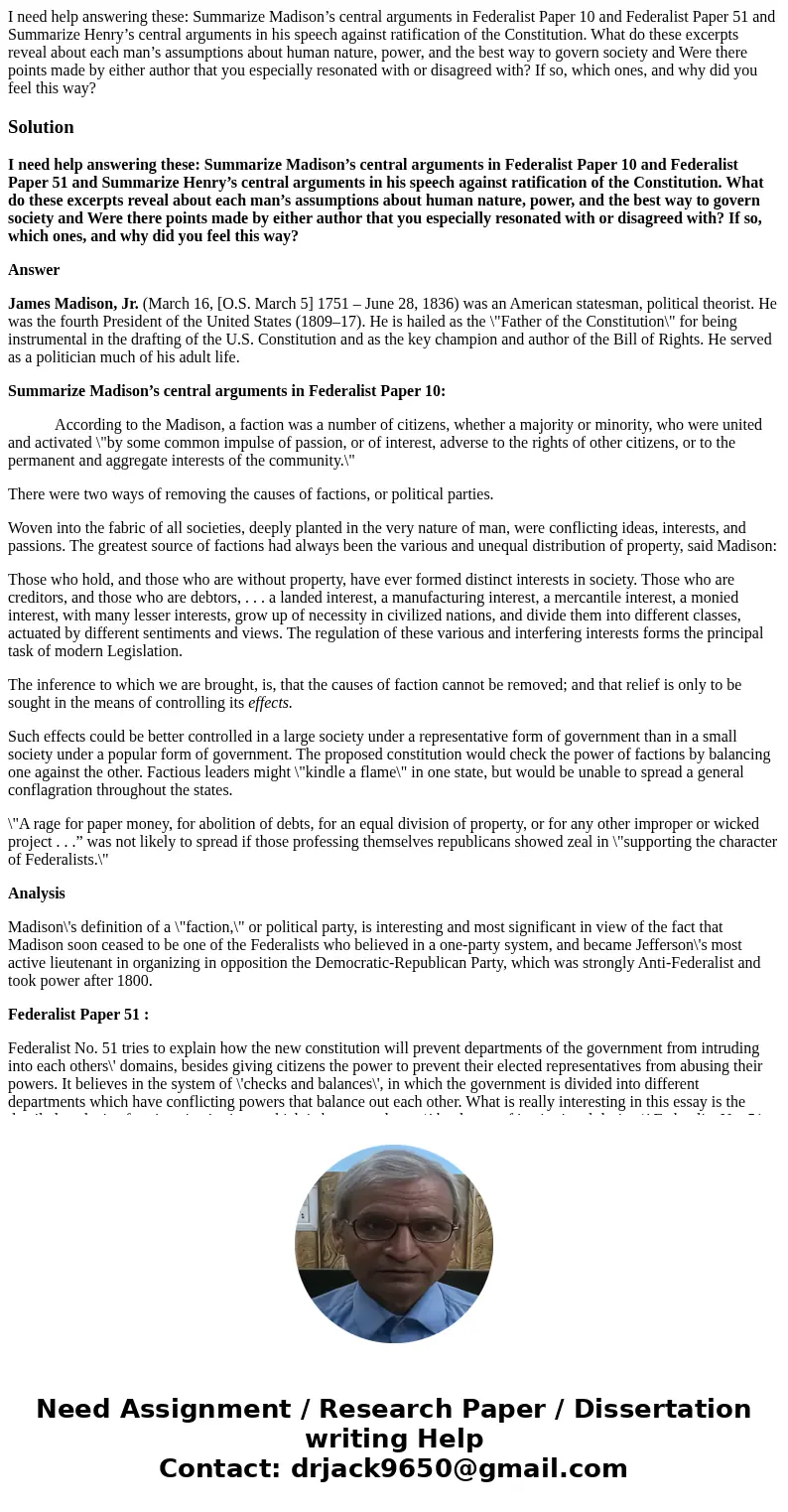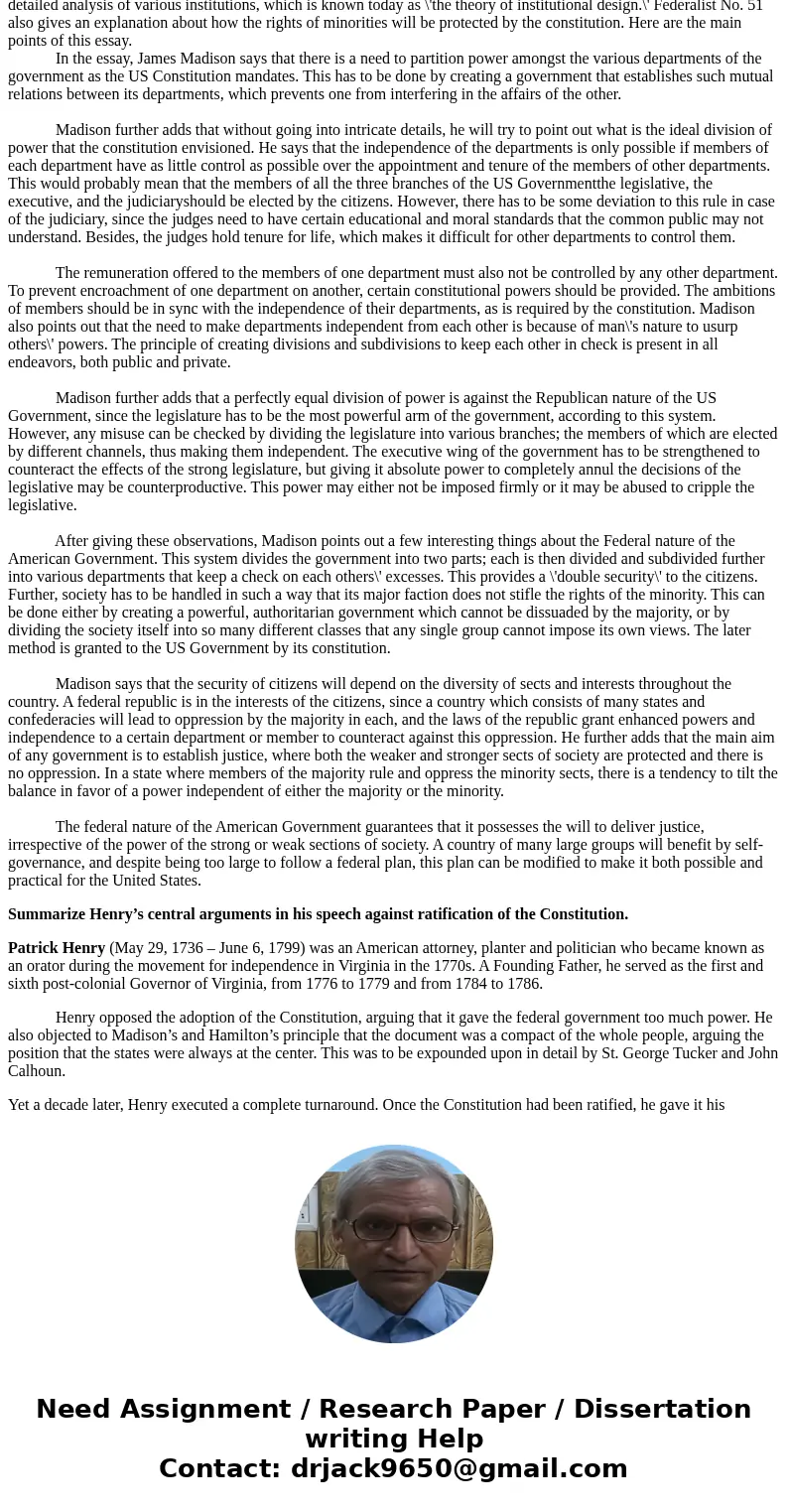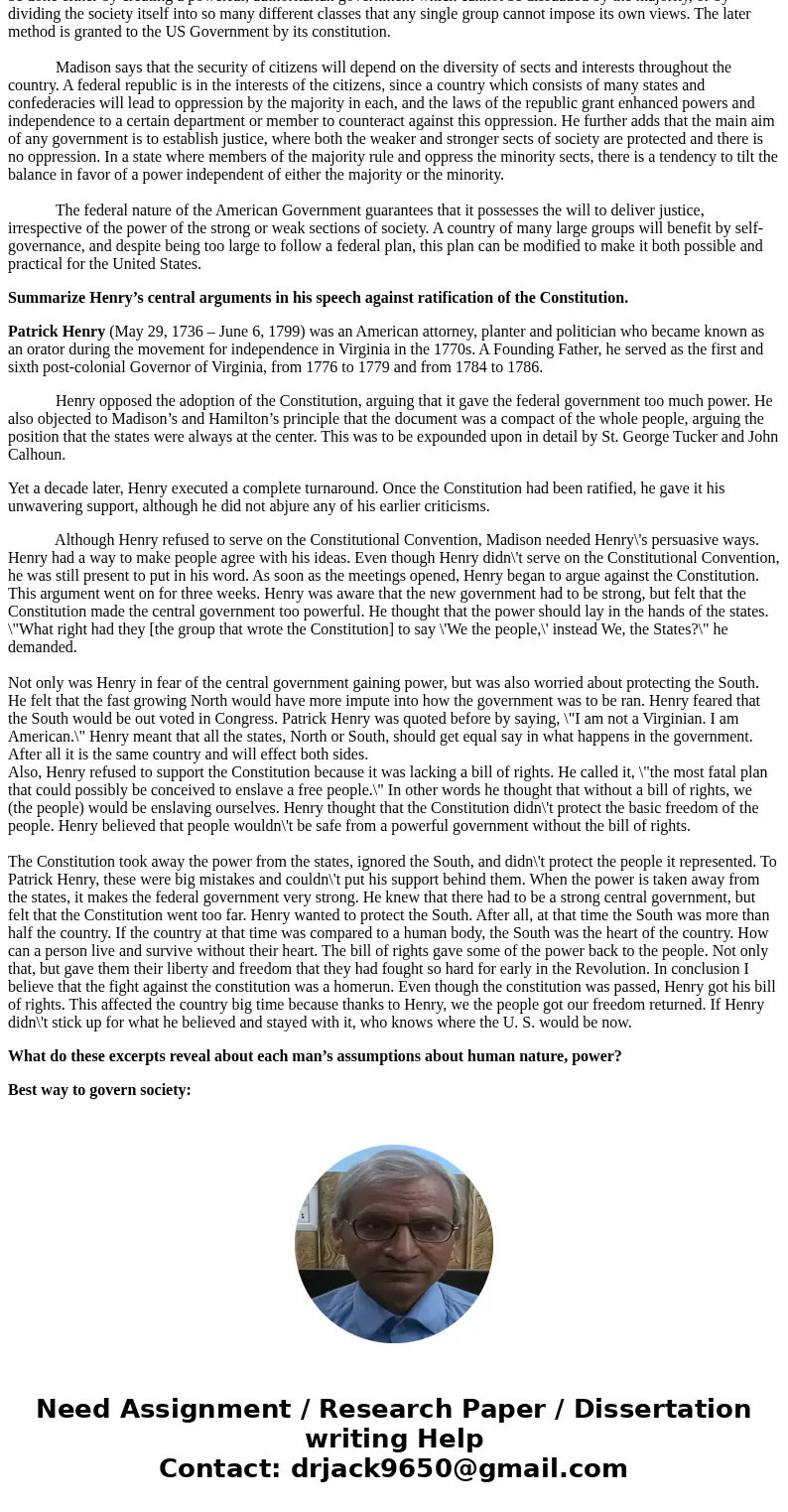I need help answering these Summarize Madisons central argum
I need help answering these: Summarize Madison’s central arguments in Federalist Paper 10 and Federalist Paper 51 and Summarize Henry’s central arguments in his speech against ratification of the Constitution. What do these excerpts reveal about each man’s assumptions about human nature, power, and the best way to govern society and Were there points made by either author that you especially resonated with or disagreed with? If so, which ones, and why did you feel this way?
Solution
I need help answering these: Summarize Madison’s central arguments in Federalist Paper 10 and Federalist Paper 51 and Summarize Henry’s central arguments in his speech against ratification of the Constitution. What do these excerpts reveal about each man’s assumptions about human nature, power, and the best way to govern society and Were there points made by either author that you especially resonated with or disagreed with? If so, which ones, and why did you feel this way?
Answer
James Madison, Jr. (March 16, [O.S. March 5] 1751 – June 28, 1836) was an American statesman, political theorist. He was the fourth President of the United States (1809–17). He is hailed as the \"Father of the Constitution\" for being instrumental in the drafting of the U.S. Constitution and as the key champion and author of the Bill of Rights. He served as a politician much of his adult life.
Summarize Madison’s central arguments in Federalist Paper 10:
According to the Madison, a faction was a number of citizens, whether a majority or minority, who were united and activated \"by some common impulse of passion, or of interest, adverse to the rights of other citizens, or to the permanent and aggregate interests of the community.\"
There were two ways of removing the causes of factions, or political parties.
Woven into the fabric of all societies, deeply planted in the very nature of man, were conflicting ideas, interests, and passions. The greatest source of factions had always been the various and unequal distribution of property, said Madison:
Those who hold, and those who are without property, have ever formed distinct interests in society. Those who are creditors, and those who are debtors, . . . a landed interest, a manufacturing interest, a mercantile interest, a monied interest, with many lesser interests, grow up of necessity in civilized nations, and divide them into different classes, actuated by different sentiments and views. The regulation of these various and interfering interests forms the principal task of modern Legislation.
The inference to which we are brought, is, that the causes of faction cannot be removed; and that relief is only to be sought in the means of controlling its effects.
Such effects could be better controlled in a large society under a representative form of government than in a small society under a popular form of government. The proposed constitution would check the power of factions by balancing one against the other. Factious leaders might \"kindle a flame\" in one state, but would be unable to spread a general conflagration throughout the states.
\"A rage for paper money, for abolition of debts, for an equal division of property, or for any other improper or wicked project . . .” was not likely to spread if those professing themselves republicans showed zeal in \"supporting the character of Federalists.\"
Analysis
Madison\'s definition of a \"faction,\" or political party, is interesting and most significant in view of the fact that Madison soon ceased to be one of the Federalists who believed in a one-party system, and became Jefferson\'s most active lieutenant in organizing in opposition the Democratic-Republican Party, which was strongly Anti-Federalist and took power after 1800.
Federalist Paper 51 :
Federalist No. 51 tries to explain how the new constitution will prevent departments of the government from intruding into each others\' domains, besides giving citizens the power to prevent their elected representatives from abusing their powers. It believes in the system of \'checks and balances\', in which the government is divided into different departments which have conflicting powers that balance out each other. What is really interesting in this essay is the detailed analysis of various institutions, which is known today as \'the theory of institutional design.\' Federalist No. 51 also gives an explanation about how the rights of minorities will be protected by the constitution. Here are the main points of this essay.
In the essay, James Madison says that there is a need to partition power amongst the various departments of the government as the US Constitution mandates. This has to be done by creating a government that establishes such mutual relations between its departments, which prevents one from interfering in the affairs of the other.
Madison further adds that without going into intricate details, he will try to point out what is the ideal division of power that the constitution envisioned. He says that the independence of the departments is only possible if members of each department have as little control as possible over the appointment and tenure of the members of other departments. This would probably mean that the members of all the three branches of the US Governmentthe legislative, the executive, and the judiciaryshould be elected by the citizens. However, there has to be some deviation to this rule in case of the judiciary, since the judges need to have certain educational and moral standards that the common public may not understand. Besides, the judges hold tenure for life, which makes it difficult for other departments to control them.
The remuneration offered to the members of one department must also not be controlled by any other department. To prevent encroachment of one department on another, certain constitutional powers should be provided. The ambitions of members should be in sync with the independence of their departments, as is required by the constitution. Madison also points out that the need to make departments independent from each other is because of man\'s nature to usurp others\' powers. The principle of creating divisions and subdivisions to keep each other in check is present in all endeavors, both public and private.
Madison further adds that a perfectly equal division of power is against the Republican nature of the US Government, since the legislature has to be the most powerful arm of the government, according to this system. However, any misuse can be checked by dividing the legislature into various branches; the members of which are elected by different channels, thus making them independent. The executive wing of the government has to be strengthened to counteract the effects of the strong legislature, but giving it absolute power to completely annul the decisions of the legislative may be counterproductive. This power may either not be imposed firmly or it may be abused to cripple the legislative.
After giving these observations, Madison points out a few interesting things about the Federal nature of the American Government. This system divides the government into two parts; each is then divided and subdivided further into various departments that keep a check on each others\' excesses. This provides a \'double security\' to the citizens. Further, society has to be handled in such a way that its major faction does not stifle the rights of the minority. This can be done either by creating a powerful, authoritarian government which cannot be dissuaded by the majority, or by dividing the society itself into so many different classes that any single group cannot impose its own views. The later method is granted to the US Government by its constitution.
Madison says that the security of citizens will depend on the diversity of sects and interests throughout the country. A federal republic is in the interests of the citizens, since a country which consists of many states and confederacies will lead to oppression by the majority in each, and the laws of the republic grant enhanced powers and independence to a certain department or member to counteract against this oppression. He further adds that the main aim of any government is to establish justice, where both the weaker and stronger sects of society are protected and there is no oppression. In a state where members of the majority rule and oppress the minority sects, there is a tendency to tilt the balance in favor of a power independent of either the majority or the minority.
The federal nature of the American Government guarantees that it possesses the will to deliver justice, irrespective of the power of the strong or weak sections of society. A country of many large groups will benefit by self-governance, and despite being too large to follow a federal plan, this plan can be modified to make it both possible and practical for the United States.
Summarize Henry’s central arguments in his speech against ratification of the Constitution.
Patrick Henry (May 29, 1736 – June 6, 1799) was an American attorney, planter and politician who became known as an orator during the movement for independence in Virginia in the 1770s. A Founding Father, he served as the first and sixth post-colonial Governor of Virginia, from 1776 to 1779 and from 1784 to 1786.
Henry opposed the adoption of the Constitution, arguing that it gave the federal government too much power. He also objected to Madison’s and Hamilton’s principle that the document was a compact of the whole people, arguing the position that the states were always at the center. This was to be expounded upon in detail by St. George Tucker and John Calhoun.
Yet a decade later, Henry executed a complete turnaround. Once the Constitution had been ratified, he gave it his unwavering support, although he did not abjure any of his earlier criticisms.
Although Henry refused to serve on the Constitutional Convention, Madison needed Henry\'s persuasive ways. Henry had a way to make people agree with his ideas. Even though Henry didn\'t serve on the Constitutional Convention, he was still present to put in his word. As soon as the meetings opened, Henry began to argue against the Constitution. This argument went on for three weeks. Henry was aware that the new government had to be strong, but felt that the Constitution made the central government too powerful. He thought that the power should lay in the hands of the states. \"What right had they [the group that wrote the Constitution] to say \'We the people,\' instead We, the States?\" he demanded.
Not only was Henry in fear of the central government gaining power, but was also worried about protecting the South. He felt that the fast growing North would have more impute into how the government was to be ran. Henry feared that the South would be out voted in Congress. Patrick Henry was quoted before by saying, \"I am not a Virginian. I am American.\" Henry meant that all the states, North or South, should get equal say in what happens in the government. After all it is the same country and will effect both sides.
Also, Henry refused to support the Constitution because it was lacking a bill of rights. He called it, \"the most fatal plan that could possibly be conceived to enslave a free people.\" In other words he thought that without a bill of rights, we (the people) would be enslaving ourselves. Henry thought that the Constitution didn\'t protect the basic freedom of the people. Henry believed that people wouldn\'t be safe from a powerful government without the bill of rights.
The Constitution took away the power from the states, ignored the South, and didn\'t protect the people it represented. To Patrick Henry, these were big mistakes and couldn\'t put his support behind them. When the power is taken away from the states, it makes the federal government very strong. He knew that there had to be a strong central government, but felt that the Constitution went too far. Henry wanted to protect the South. After all, at that time the South was more than half the country. If the country at that time was compared to a human body, the South was the heart of the country. How can a person live and survive without their heart. The bill of rights gave some of the power back to the people. Not only that, but gave them their liberty and freedom that they had fought so hard for early in the Revolution. In conclusion I believe that the fight against the constitution was a homerun. Even though the constitution was passed, Henry got his bill of rights. This affected the country big time because thanks to Henry, we the people got our freedom returned. If Henry didn\'t stick up for what he believed and stayed with it, who knows where the U. S. would be now.
What do these excerpts reveal about each man’s assumptions about human nature, power?
Best way to govern society:



 Homework Sourse
Homework Sourse